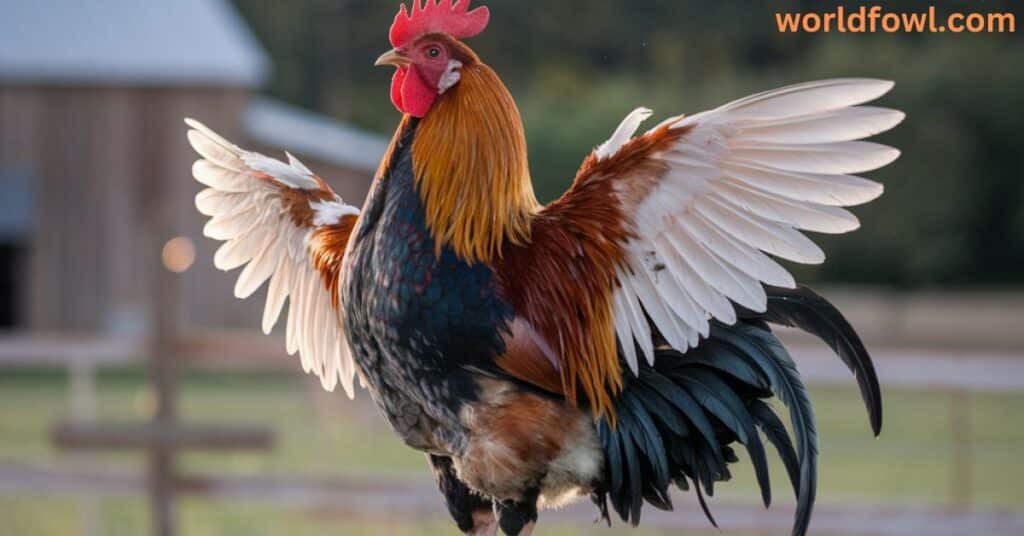Roosters have long been symbols of strength, pride, and protection in many cultures. From their striking appearance to their loud crowing that greets the morning, roosters often evoke admiration from poultry keepers and casual observers alike. However, there’s another side to these creatures that can leave people wondering: Why do roosters attack humans?
It might seem unusual, considering that roosters are commonly raised for their eggs, meat, and ornamental purposes, but their behavior can turn aggressive under certain conditions. These attacks are usually triggered by natural instincts, and understanding why they act the way they do can make interactions with them safer and more harmonious.
In this article, we will dive deep into the six main reasons why roosters attack humans. We’ll examine the causes of their aggression, including their territorial instincts, dominance behavior, and protective nature. We will also discuss how to prevent these attacks, signs of aggression to look out for, and how to handle these situations safely. Understanding rooster aggression causes will ultimately help you build a better relationship with your feathered friends.
What Is a Rooster?
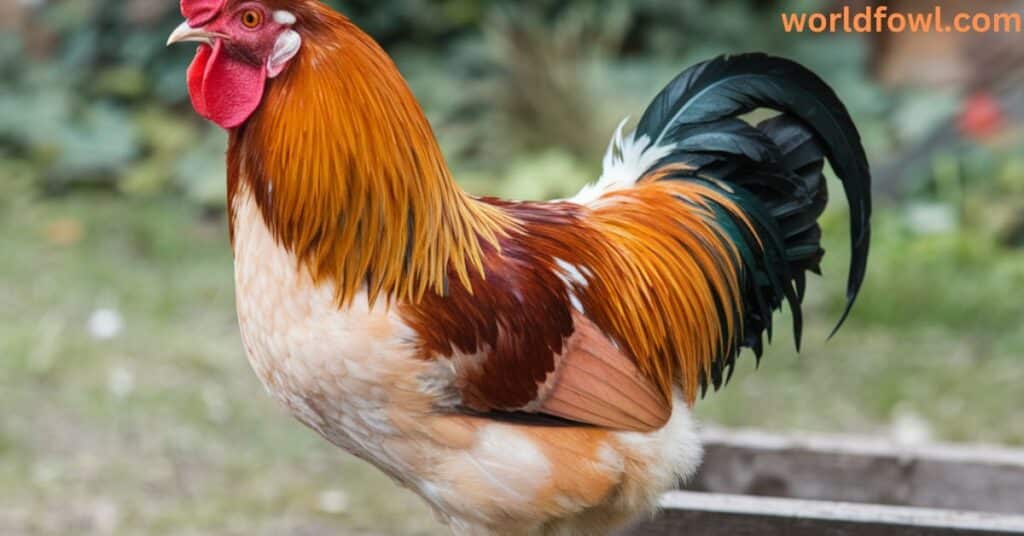
Before we discuss the causes of aggression, let’s first understand what a rooster is and why it behaves the way it does.
A rooster is the male counterpart of a chicken, and its primary role in a flock is that of a leader and protector. Roosters are often seen strutting around, guarding the hens, crowing at dawn, and even acting as sentries against predators. Their sharp beaks and spurs (the bony structures on the backs of their legs) are tools they use for defense. A rooster’s job is crucial for the survival and protection of the flock. However, these same instincts that make them excellent guardians can also lead to aggression, particularly towards humans.
Roosters are naturally territorial and hierarchical creatures, which is why they develop such complex behaviors. They’re constantly asserting dominance over others, both within their flock and in relation to humans. With their sharp instincts and hormonal fluctuations, it’s easy to see why they can be unpredictable at times. Let’s explore the six most common reasons Why Do Roosters Attack Humans?
See Also : Do Horses Attack Humans? Horse Behavior
1. Territorial Instincts
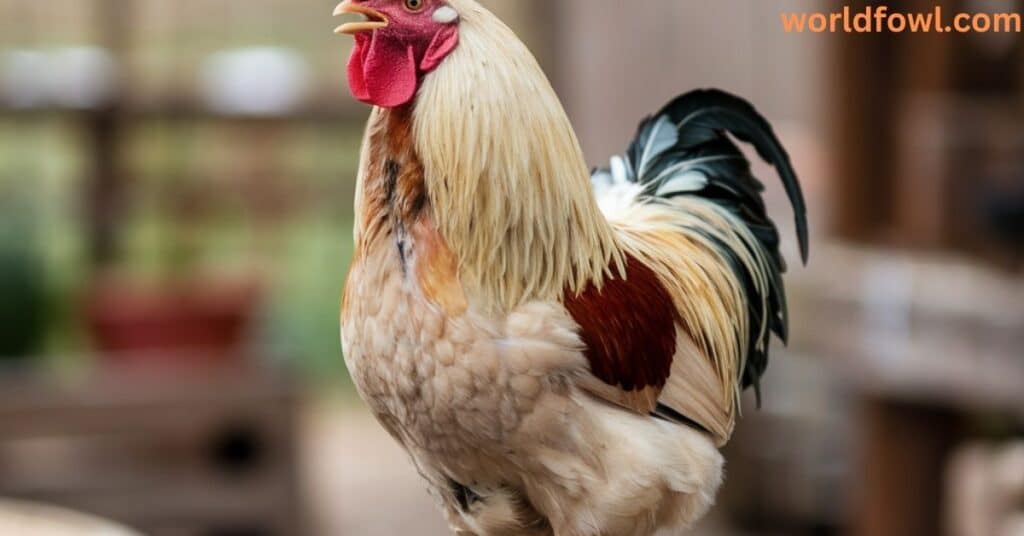
Roosters are incredibly territorial animals. This means they are highly protective of the spaces they consider “theirs,” including the hens they guard and the areas where they roam. When a human enters what the rooster perceives as its territory, it may attack as a defense mechanism.
How Territorial Aggression Works
Roosters naturally defend their territory from perceived invaders, including humans, other animals, and even other roosters. When a human enters a rooster’s space, especially too close to its hens or favorite roosting spots, the rooster may feel threatened and will often lash out. Territorial rooster behavior becomes even more pronounced if the rooster has not been raised with a strong understanding of human interaction.
For example, if you walk into a rooster’s space and make sudden movements, it might see that as an attack on its territory. The rooster could then charge at you, flapping its wings and using its sharp spurs as a weapon. A rooster defending its turf may even chase humans away to protect its hens, which are the center of its world.
How to Handle Territorial Rooster Behavior
- Maintain respectful boundaries: Respect the rooster’s personal space, particularly when it’s near its hens or its favorite spots. Giving it room to roam without feeling threatened is key to reducing aggression.
- Be aware of body language: If a rooster starts puffing up its chest or makes aggressive noises, take a step back. These are clear warning signs that it’s ready to defend its territory.
- Provide ample space: Ensure that the rooster has enough space to roam and establish clear boundaries so it doesn’t feel the need to protect its entire environment from perceived invaders.
Warning Signs of Territorial Aggression
- Crowing loudly to establish dominance
- Puffing up and enlarging its body to appear more intimidating
- Charging or chasing after anyone who gets too close to its territory
- Tensing its body in a defensive stance
See Also : Can Geese Attack Humans? Geese Gone Wild
2. Dominance Assertion
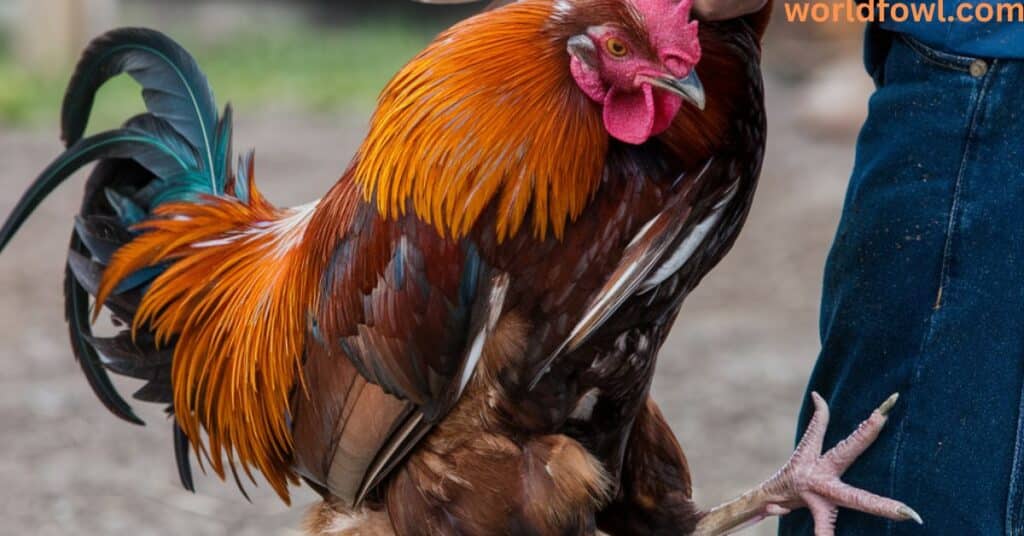
In a flock, roosters are responsible for maintaining the pecking order, the hierarchy that determines which bird is dominant and which is subordinate. The rooster naturally assumes the top position, but he will often need to assert that dominance both within the flock and over humans.
How Dominance Plays Out in Roosters
A rooster will not hesitate to assert its dominance, and this behavior can be directed toward humans, especially if it feels that its authority is being challenged. Sometimes, dominance in flocks becomes evident when roosters show aggression toward humans who might be seen as “challengers.” This is particularly common in young roosters who are still figuring out their place in the world.
If a human enters the rooster’s environment, the rooster may interpret that as a challenge to its status. The rooster might charge at the human, pecking or flapping its wings, in an effort to show who is in charge. This behavior is driven by the rooster’s instinct to maintain its role as the leader of the flock.
Managing Dominance-Based Aggression
- Socialize early: Roosters that are handled and socialized early on tend to be less aggressive towards humans. The key is consistent, gentle interaction from a young age to reinforce the understanding that humans aren’t rivals.
- Establish clear boundaries: Show the rooster that you respect its role by not challenging its space or hens unnecessarily.
- Use positive reinforcement: Reward calm behavior with food or attention to create positive associations with human presence.
Key Signs of Dominance Assertion
- Aggressive stance: The rooster may puff up its chest or stand tall to assert its authority.
- Chasing or pecking: The rooster may try to chase or peck at humans to establish dominance.
- Constant crowing: Crowing isn’t just for waking up; it’s often a way for the rooster to signal its presence and status.
See Also : Do Kiwi Birds Attack Humans?
3. Hormonal Surges
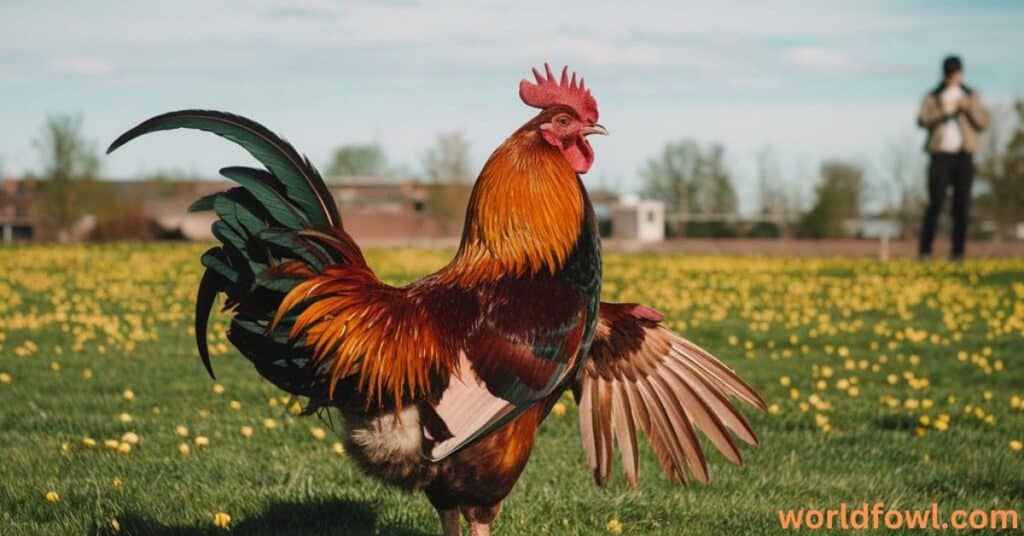
During the breeding season, hormonal surges in roosters play a significant role in their aggressive behavior. Testosterone levels rise during this time, which can make roosters more protective and unpredictable.
How Hormones Affect Rooster Behavior
Roosters experience a natural cycle of hormonal changes, with testosterone levels spiking during mating season. These hormonal fluctuations contribute significantly to aggressive rooster behavior, especially when it comes to defending their hens and asserting their dominance. The increase in testosterone causes heightened sensitivity to perceived threats, including humans, which is why hormonal aggression can become a major issue during certain times of the year.
How to Handle Hormonal Aggression
- Limit contact during mating season: If possible, limit your interactions with roosters during peak hormonal periods. This can help reduce the likelihood of aggressive behavior.
- Provide outlets for energy: Roosters may become aggressive when they have too much pent-up energy. Providing them with enough space to roam and stimulating their minds can help reduce frustration.
Warning Signs of Hormonal Aggression
- Increased territorial behavior: The rooster may become more territorial and aggressive during mating season.
- Intense charging and attacks: A hormonal surge can make a rooster more likely to chase after and attack humans.
- Changes in crowing patterns: Roosters may crow more frequently, signaling their heightened aggression.
See Also : Do Quails Attack Humans? A Deep Dive!
4. Perceived Threats
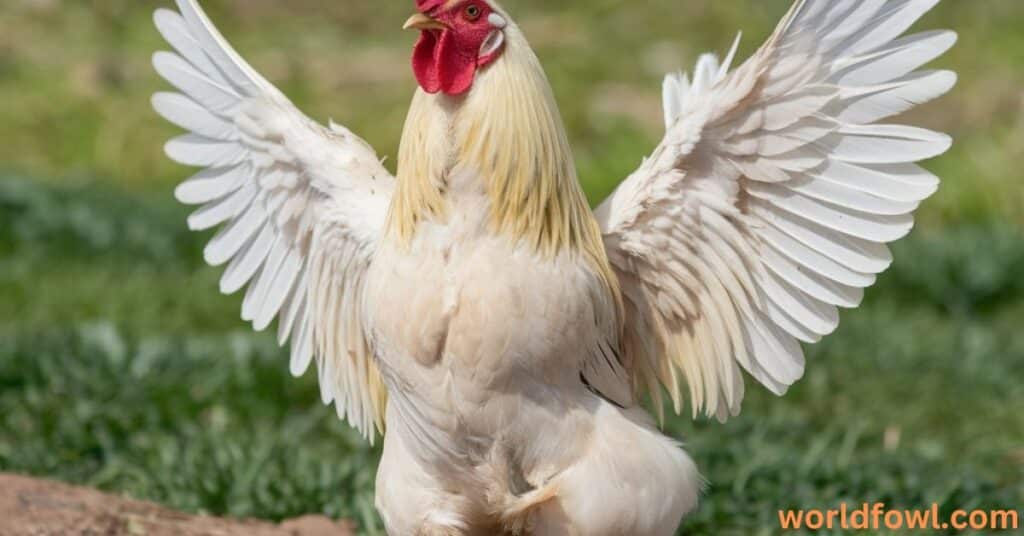
Roosters are deeply protective of their flock, and they will attack if they perceive a threat. This could include anything from a predator to a human who gets too close to the hens. Roosters are highly attuned to their environment, and they interpret any change as a potential danger.
How Threat Perception Triggers Aggression
Roosters are sensitive to their surroundings. If a human approaches too quickly or behaves in a way that seems threatening (such as moving too suddenly), the rooster may feel the need to protect its hens. Roosters are often aggressive toward perceived threats, whether those threats are humans or other animals. The rooster will rush to defend its flock by charging or even attacking.
Handling Threat-Based Aggression
- Stay calm and slow your movements: Avoid sudden gestures that might startle the rooster or make it feel threatened.
- Give space to the hens: If you need to approach the hens, do so carefully and respectfully, giving the rooster space to assess the situation.
- Build trust: Over time, you can build trust with your rooster, reducing its tendency to perceive you as a threat.
Signs of Threat-Induced Aggression
- Aggressive body language: The rooster may puff up its chest or tense its body, preparing to defend its flock.
- Charging or chasing: A rooster will often charge or chase to protect its hens from what it perceives as danger.
- Increased crowing: Crowing can escalate when the rooster senses a threat, acting as both a warning and a call for backup.
See Also : Spiritual Meanings Of A Dog Running Away
5. Lack of Socialization

A rooster that has not been properly socialized with humans is much more likely to react with aggression. Socializing roosters from a young age helps them build positive associations with humans and reduces the likelihood of aggressive attacks.
The Importance of Early Socialization
Roosters that are raised without much human interaction often develop fear or mistrust toward humans. This fear can turn into aggression, especially if the rooster feels cornered or threatened. By engaging with the rooster gently and consistently from a young age, you can help it become more comfortable with human presence. This can greatly reduce the likelihood of attacks in adulthood.
Socialization Practices to Avoid Aggression
- Handle from a young age: Gently hold and interact with your rooster regularly from the time it is a chick. This helps the rooster become accustomed to human touch and reduces fear-based aggression.
- Reward positive interactions: Offer treats and praise when the rooster remains calm during human interaction.
- Create safe spaces: Give the rooster its own space where it feels secure, reducing the likelihood of stress-induced aggression.
Signs of Poor Socialization
- Fearful reactions: Roosters that haven’t been socialized may shy away or react with aggression when approached by humans.
- Unexpected attacks: Roosters raised without human contact are more likely to suddenly charge or peck at people.
- Increased flightiness: A rooster that’s not used to human interaction may become overly skittish or defensive.
See Also : Spiritual Meaning Of A Deer In Your Path
6. Protecting the Flock

Roosters view themselves as the primary protectors of their hens. Any perceived threat to their flock protection dynamics can trigger an attack. This includes not just predators but also humans who may unintentionally come too close to the hens.
How Protection Instincts Lead to Aggression
Roosters will attack when they feel that their flock is in danger. Whether it’s a new person, an unfamiliar animal, or an object that threatens their hens, the rooster sees itself as the flock’s guardian. This instinct can make roosters very protective, often leading to attacks on humans if they approach too closely or disturb the hens.
Protecting the Flock: How to Manage
- Don’t approach the hens too closely: Always respect the rooster’s protective instincts and avoid disturbing the hens unnecessarily.
- Stay calm around the rooster: The less you make the rooster feel that its flock is under threat, the less likely it is to react aggressively.
- Create a calm environment: Keep the space around your flock peaceful to reduce stress on the rooster.
Signs of Protective Aggression
- Vocalizing loudly: Roosters will often crow or make other noises to warn of danger to their hens.
- Flapping wings: The rooster may spread its wings wide to make itself appear larger when it’s trying to protect the hens.
- Charging or chasing humans: If a person gets too close to its flock, the rooster will often charge in an effort to protect its hens.
FAQs: Why Do Roosters Attack Humans
Why Do Roosters Become Aggressive?
Roosters can become aggressive due to natural instincts such as territorial aggression, dominance, and protecting their flocks. Hormonal surges during breeding season can also exacerbate aggression.
Can a Rooster Attack Cause Serious Harm?
While a rooster’s attack is generally not life-threatening, it can still cause serious injury. The spurs on a rooster’s legs can lead to deep scratches and bruises. Avoiding an attack or knowing how to manage it is essential.
Are Some Rooster Breeds More Aggressive Than Others?
Yes, some rooster breeds are known for being more aggressive. Breeds like Gamecocks and Rhode Island Reds tend to show more territorial and aggressive behavior. In contrast, breeds like Silkies and Orpingtons are known for being more docile.
How Can I Calm Down an Aggressive Rooster?
Calming an aggressive rooster requires patience. Start by socializing roosters early, using handling techniques, and reinforcing calm behavior. It may also help to reduce the rooster’s stress by giving it more space.
What Should I Do If a Rooster Attacks Me?
If a rooster attacks, calmly remove yourself from the situation. Protect your face and hands, and if necessary, use a stick or other object to create distance between you and the rooster.
Conclusion: Why Do Roosters Attack Humans
Understanding why roosters attack humans is key to reducing conflict and ensuring a harmonious relationship between you and your birds. Roosters are naturally territorial, hierarchical, and protective creatures, and much of their aggression stems from these instincts. Recognizing the signs of aggression and taking preventive measures—like proper socialization, respecting territorial boundaries, and understanding hormonal cycles—can help you manage your interactions with roosters.
By taking these steps, you can avoid dangerous encounters and build a stronger, more trusting bond with your rooster. After all, a well-socialized and well-respected rooster can be a loyal guardian of the flock—and a much more enjoyable companion for poultry owners. { Why Do Roosters Attack Humans }

Henry James is a seasoned blogger and a passionate storyteller on “World Fowl.” With years of experience crafting engaging content, he brings a unique blend of expertise and creativity to his writing. Henry specializes in exploring diverse topics with depth and clarity, captivating readers worldwide.

